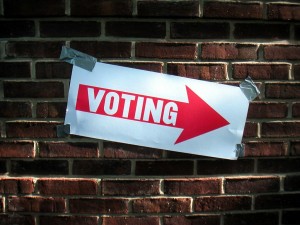Attendance at an MOC’s town hall meeting or a public event where the MOC is present can be a very effective way of interacting with your MOC. Not all of our area MOCs conduct traditional town hall meetings; some may hold telephone town hall meetings, and others (U.S. Senators especially) may not do either. (State legislators are more likely to hold in-person town hall meetings.)
The town hall meeting format allows participants to ask questions of the MOC. If called on, you may introduce your question with a very brief statement of the issue and why you care about it; but you won’t be able to share much information, as you could in a visit with the MOC or his/her staff. Here are some tips about participating in an in-person or telephone town hall meeting:
- Find out when your MOC’s next town hall meeting will be, either from the MOC’s website or by calling the office. If the date has not been set, ask to be added to a list to receive an email notice when the next town hall meeting is scheduled.
- Ideally, get a group together to attend or participate in the town hall meeting, and have each person register on the MOC’s website.
- Research your MOC’s position and voting record on the issue, and prepare a list of questions for your group to ask the MOC in light of your research.
- If you’re attending an in-person town hall meeting, the group should get there early, spread out, and find seats near the front of the room.
- When the floor is opened for questions, everyone in the group should raise his/her hand to be called on (or should get in the queue to ask a question in a telephone town hall meeting). In an in-person town hall meeting, look friendly or neutral to increase your chances of being called on.
- The first member of your group to be called on should ask the first question. If the MOC doesn’t give a straight answer, ask a follow-up question if possible.
- In an in-person town hall meeting, after that question is answered, everyone else in the group should raise his/her hand again; and whoever is called on next should ask the second question on the list. And so on. (In a telephone town hall meeting, everyone will already be in the queue to ask a question.)
- At the conclusion of the town hall meeting, participants who were not able to ask their questions may be given an opportunity to submit them to the MOC’s staff for an email response later. Take advantage of that opportunity if the group has questions that were not asked during the town hall meeting.
Public comment hearings are another good opportunity to influence your elected officials at the state and local level. Residents can typically testify for three minutes each on an issue of concern to them. Here are some tips for participating in a public comment hearing:
- Find out when the next public comment hearing will be by checking the government entity's website.
- Ideally, get a group together to attend the hearing, and have each person register by following the instructions on the government entity's website.
- Decide on the issue(s) your group will cover, and decide what aspect of the issue(s) each person will address.
- Prepare your remarks in writing, and make sufficient copies for each legislator or other official expected, plus a couple of extra copies for the clerk, plus a few extra copies for any media present. Practice and time your delivery, since you have only three minutes for your presentation. Your written materials can be a bit longer and can include attachments. You may use slides, maps, graphs, videos, etc. in your presentation, as long as you can do so within your allotted time.
- When the hearing begins, the clerk will call the names of the first two speakers. The first speaker will come to the lectern, while the second comes and sits up front, ready to speak when the first speaker finishes. The clerk will then call the names of the second and third speakers, and so on.
- When your name is called the first time, move to the “on-deck” chair, bringing the copies of your remarks for the legislators or supervisors and the clerk. When the speaker before you finishes and your name is called again, walk over to the clerk and hand him or her the copies of your remarks, then return to the lectern and begin your remarks. A positive tone and good eye contact will make your presentation more effective. Conclude with your specific “ask” for the legislators or other officials.
- Following your remarks, you may be approached by the media, in which case provide the reporter with a copy of your remarks and answer any questions he or she may have.
Finally, MOCs (and state and local elected officials) attend other public events in the community. These are not typically geared toward constituent input, but some of them may give you an opportunity to interact informally with your MOC—or to stage a noisy protest, if the issue and circumstances warrant.
See the Indivisible Guide for additional guidance on attendance at town hall meetings or other public events.
Return to the main Advocacy page to explore other tools available for advocacy.



